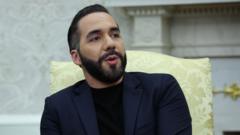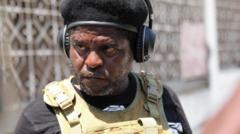Kilmar Ábrego García faces uncertainty after being deported from the US to El Salvador amid claims of gang affiliation
El Salvador Refuses to Return Mistakenly Deported US Resident

El Salvador Refuses to Return Mistakenly Deported US Resident
Controversial decision highlights tensions between US immigration policy and international relations
El Salvador's President Nayib Bukele has announced that the country would not facilitate the return of Kilmar Ábrego García, a Salvadoran national who was mistakenly deported from the United States. García, currently held in a notorious mega-prison in El Salvador, finds himself at the center of diplomatic and legal disputes following a recent US Supreme Court ruling. The court mandated that the Trump administration ensure García's return, as he had been living in Maryland with his family and was granted legal protections against deportation.
During a meeting at the White House with Donald Trump, Bukele emphasized his administration’s decision not to cooperate with the return, despite the Supreme Court's directive. The Trump administration argues that the responsibility lies with El Salvador, as Attorney General Pam Bondi stated it was up to the nation whether they would accept the return of García. The US administration has been under scrutiny for its policies relating to deportation, particularly those targeting individuals it suspects are linked to gangs, such as MS-13 and Tren de Aragua.
Despite his lawyer denying the allegations of gang involvement, the US government maintains that García is affiliated with criminal organizations. Following a steady stream of deportations under the Trump administration, Garcia was one of many individuals sent to the Center for the Confinement of Terrorism (Cecot), a facility notorious for its harsh conditions. Reports indicate that over 200 alleged gang members have faced similar deportations, raising concerns about due process and human rights violations.
As part of a broader strategy to strengthen security ties and bolster support from Central American nations, Bukele has received accolades from Trump for agreeing to accept deported individuals. Bukele's relationship with the Trump administration has been characterized as mutually beneficial, with both leaders reinforcing their hardline stances on immigration and crime. In light of ongoing legal battles and allegations over the treatment of detainees in Cecot, the fate of Kilmar Ábrego García remains uncertain, caught between legal loopholes and complex international policies surrounding deportation.
During a meeting at the White House with Donald Trump, Bukele emphasized his administration’s decision not to cooperate with the return, despite the Supreme Court's directive. The Trump administration argues that the responsibility lies with El Salvador, as Attorney General Pam Bondi stated it was up to the nation whether they would accept the return of García. The US administration has been under scrutiny for its policies relating to deportation, particularly those targeting individuals it suspects are linked to gangs, such as MS-13 and Tren de Aragua.
Despite his lawyer denying the allegations of gang involvement, the US government maintains that García is affiliated with criminal organizations. Following a steady stream of deportations under the Trump administration, Garcia was one of many individuals sent to the Center for the Confinement of Terrorism (Cecot), a facility notorious for its harsh conditions. Reports indicate that over 200 alleged gang members have faced similar deportations, raising concerns about due process and human rights violations.
As part of a broader strategy to strengthen security ties and bolster support from Central American nations, Bukele has received accolades from Trump for agreeing to accept deported individuals. Bukele's relationship with the Trump administration has been characterized as mutually beneficial, with both leaders reinforcing their hardline stances on immigration and crime. In light of ongoing legal battles and allegations over the treatment of detainees in Cecot, the fate of Kilmar Ábrego García remains uncertain, caught between legal loopholes and complex international policies surrounding deportation.


















